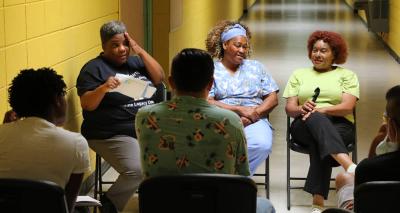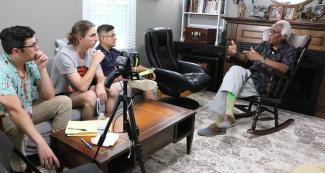The Samuel Proctor Oral History Project in Two Communities

Photo courtesy of the Samuel Proctor Oral History Program, University of Florida
An oral history with Ms. Vera Rodgers White, Ms. Queen Esteis, and Ms. Shirley Jimmerson by Samuel Proctor Oral History Program students, in Elaine, AR, 2022. Watch the interview.
In 1919, there was a horrific massacre in Elaine, Arkansas, of the Black population by white cotton empire-builders and the United States military. Descendants carry the scars from that event.
Ending Racism USA board member, Dr. Mary Olson, is a pastor in Elaine. She and other community leaders knew stories about this and other events are passed from one generation to another. As those stories began to be told, it became clear that the descriptions of the massacre told by white people were inaccurate. The white story described the Black residents in 1919 as poor sharecroppers who were planning to strike and were engaging in other subversive activities.
The stories passed from generation to generation by the Black descendants told a very different story. The Black community in Elaine in 1919 consisted of prosperous businesspeople and successful land-owning farmers. The massacre was not driven by a desire to end some kind of subversion. Rather, the motive was to destroy a prosperous Black community and steal valuable farmland from Black farmers.
With the community leaders' awareness of the importance of these stories, Dr. Paul Ortiz from the University of Florida's Samuel Proctor Oral History Project brought students to Elaine to collect stories from descendants of the massacre. One result was that the Black community was empowered by their stories being taken seriously. The commitment to the process of discovering the true history and sharing it was reinforced.
In 2021, Ending Racism USA gathered a small group of people who represented organizations providing resources for local communities to address racism. Dr. Olson invited Dr. Paul Ortiz to that meeting. Shortly after that, Larry Rubin joined the Ending Racism USA team as the co-editor of the Ending Racism USA Newsletter.

Photo courtesy of the Samuel Proctor Oral History Program, University of Florida
Participants in the Samuel Proctor Oral History Program film an oral history with Dr. Leslie Burl McLemore at the home of Larry Rubin in Holly Springs, MS, 2022. Watch the interview.
Hearing about the University of Florida program, Rubin took the idea to Holly Springs, Mississippi, where he lives. This led to students from the University of Florida going to Holly Springs in the summer of 2022. They collected oral histories from people and family members of those who participated in civil rights work in the 1950s, 60s, and 70s.
As in Elaine, the true history of what happened and the brave and heroic activism of the Black community has often been misrepresented, and the stories were untold. The oral history project in Holly Springs opened conversations and brought new energy to current efforts to address racism and the scars left from the past. Larry Rubin reported that after the students left, more than a dozen additional people came forward wanting to make sure their stories are also told because they believe that the heroism of many people in towns across the south is not fully appreciated.
A strategic program of Ending Racism USA is to facilitate connections like the ones between Elaine and Holly Springs. Your continued financial support makes this possible.
Video by Ken Bedell, Ending Racism USA
Dr. Paul Ortiz, director of the Samuel Proctor Oral History Program and professor of history at the University of Florida, talks with Ken Bedell of Ending Racism USA about the importance of the Elaine Legacy Center in Elaine, Arkansas.
